- Home
- Kazuo Ishiguro
When We Were Orphans Page 2
When We Were Orphans Read online
Page 2
Of course, the evening turned out to be a major disappointment—even if, as you will presently see, it was to prove particularly significant for quite other reasons. What I did not know at this point was that in this country, detectives tend not to participate in society gatherings. This is not through any lack of invitations; my own recent experience will testify to the fact that fashionable circles are forever trying to recruit the celebrated detectives of the day. It is just that these same persons tend to be earnest, often reclusive individuals who are dedicated to their work and have little inclination to mingle with one another, let alone with “society” at large.
As I say, this was not something I appreciated as I arrived at the Charingworth Club that evening and followed Osbourne’s example of cheerily greeting the grandly uniformed doorman. But I was quickly disabused within minutes of our entering the crowded room on the first floor. I do not know how exactly this occurred—for I had not had the time to ascertain the identities of anyone present—but a kind of intuitive revelation swept over me which made me feel utterly foolish about my earlier excitement. Suddenly it seemed unbelievable that I had ever expected to find Matlock Stevenson or Professor Charleville hob-nobbing with the financiers and government ministers I knew were around me. Indeed, I was so thrown by this discrepancy between the event I had arrived at and the one I had been thinking about throughout the afternoon, that all my poise, at least temporarily, deserted me, and for half an hour or so, much to my annoyance, I could not bring myself to leave Osbourne’s side.
I am sure this same agitated frame of mind accounts for the fact that when I now think back to that evening, so many aspects seem somewhat exaggerated or unnatural. For instance, when I now try to picture the room, it is uncommonly dark; this despite the wall lamps, the candles on the tables, the chandeliers above us—none of which seem to make any impression on the pervading darkness. The carpet is very thick, so that to move about the room, one is obliged to drag one’s feet, and all around, greying men in black jackets are doing just this, some even pressing forward their shoulders as if walking into a gale. The waiters, too, with their silver trays, lean into conversations at peculiar angles. There are hardly any ladies present, and those one can see seem oddly self-effacing, almost immediately melting from one’s view behind the forest of black evening suits.
As I say, I am sure these impressions are not accurate, but that is how the evening remains in my mind. I remember standing about frozen with awkwardness, repeatedly sipping from my glass, as Osbourne chatted amiably with one guest after another, most of them a good thirty years older than us. I did once or twice try to join in, but my voice sounded conspicuously child-like, and in any case, most conversations centred on people or issues about which I knew nothing.
After a while, I grew angry—at myself, at Osbourne, at the whole proceedings. I felt I had every right to despise the people around me; that they were for the most part greedy and self-seeking, lacking any idealism or sense of public duty. Fuelled by this anger, I was at last able to tear myself away from Osbourne and move off through the darkness into another part of the room.
I came to an area illuminated by a dull pool of light cast by a small wall lantern. The crowd was thinner here, and I noticed a silver-haired man of perhaps seventy smoking with his back to the room. It took a moment for me to realise he was gazing into a mirror, and by then he had noticed me looking at him. I was about to hurry on, when he said without turning:
“Enjoying yourself?”
“Oh yes,” I said with a light laugh. “Thank you. Yes, a splendid occasion.”
“But a little lost, eh?”
I hesitated, then gave another laugh. “Perhaps a little. Yes, sir.”
The silver-haired man turned and studied me carefully. He then said: “If you wish, I’ll tell you who some of these people are. Then if there’s anyone you want especially to talk to, I’ll take you over and introduce you. What do you say to that?”
“That would be most kind. Most kind indeed.”
“Good.”
He came a step closer and surveyed what was visible to us of the room. Then leaning towards me, he proceeded to point out this personage and that. Even when the name was an illustrious one, he would remember to add for my benefit “the financier,” “the composer,” or whatever. With the less well known, he would summarise in some detail the person’s career and the reason for his importance. I believe he was in the midst of telling me about a clergyman standing quite near us, when he broke off suddenly and said:
“Ah. I see the attention has drifted.”
“I’m terribly sorry . . .”
“Quite all right. Perfectly natural, after all. Young fellow like you.”
“I assure you, sir . . .”
“No apology required.” He gave a laugh and nudged my arm. “Find her pretty, eh?”
I did not know quite how to respond. I could hardly deny I had been diverted by the young woman several yards to our left, at that moment in conversation with two middle-aged men. But as it happened, that first time I saw her, I did not think her at all pretty. It is even possible I somehow sensed, there and then, at my first sight of her, those qualities which I have since discovered to be so significantly a part of her. What I saw was a small, rather elf-like young woman with dark, shoulder-length hair. Even though at that moment she was clearly wishing to charm the men she was talking to, I could see something about her smile that might in an instant turn it into a sneer. A slight crouch around her shoulders, like that of a bird of prey, gave her posture a suggestion of scheming. Above all, I noticed a certain quality around her eyes—a kind of severity, something ungenerously exacting—which I see now, in retrospect, was what more than anything else caused me to stare at her with such fascination that evening.
Then, as we were both still gazing at her, she looked our way, and recognising my companion, sent him a quick, cold smile. The silver-haired man gave a salute and a respectful bow of the head.
“A charming young lady,” he murmured, as he began leading me away. “But no sense in a chap like you wasting time pursuing her. I don’t mean to be offensive, you look a jolly decent type. But you see, that’s Miss Hemmings. Miss Sarah Hemmings.”
The name meant nothing to me. But whereas my guide had earlier been so conscientious in supplying me with the backgrounds of those he had pointed out, he uttered the name of this woman clearly expecting me to be familiar with it. So it was that I nodded and said:
“Oh yes. So that’s Miss Hemmings.”
The gentleman paused again and surveyed the room from our new vantage point.
“Now let me see. I take it you’re looking for someone to give you a leg up in life. Correct? Don’t worry. Played much the same game myself when I was young. Now let me see. Who do we have here?” Then he turned back to me suddenly to ask: “Now what was it again you said you wanted to do with your life?”
Of course, I had not at that point told him anything. But now, after a slight hesitation, I answered simply:
“Detective, sir.”
“Detective? Hmm.” He continued to gaze around the room. “You mean . . . a policeman?”
“More a private consultant.”
He nodded. “Naturally, naturally.” He continued to draw on his cigar, deep in thought. Then he said: “Not interested in museums, by any chance? Chap over there, known him for years. Museums. Skulls, relics, that kind of thing. Not interested? Didn’t think so.” He went on gazing around the room, sometimes craning his neck to see someone. “Of course,” he said eventually, “a lot of young men dream of becoming detectives. I dare say I did once, in my more fanciful moments. One feels so idealistic at your age. Longs to be the great detective of the day. To root out single-handedly all the evil in the world. Commendable. But really, my boy, it’s just as well to have, let us say, a few other strings to your bow. Because a year or two from now—I don’t mean to be offensive—but pretty soon you’ll feel quite differently about things. Are you int
erested in furniture? I ask because over there stands none other than Hamish Robertson himself.”
“With all respect, sir. The ambition which I just confided to you is hardly the whim of a moment. It’s a calling I’ve felt my whole life.”
“Your whole life? But what are you? Twenty-one? Twenty-two? Well, I suppose I shouldn’t discourage you. After all, if our young men won’t entertain idealistic notions of this sort, who is there to do so? And no doubt, my boy, you believe today’s world to be a far more evil place than the one of thirty years ago, is that it? That civilisation’s on the brink and all that?”
“As a matter of fact, sir,” I said curtly, “I do believe that to be the case.”
“I remember when I thought so too.” Suddenly his sarcasm had been replaced by a more kindly tone, and I even thought I saw tears fill his eyes. “Why is it, do you suppose, my boy? Is the world really getting more evil? Is Homo sapiens degenerating as a species?”
“I don’t know about that, sir,” I replied, this time more gently. “All I can say is that to the objective observer, the modern criminal is growing increasingly clever. He has grown more ambitious, more daring, and science has placed a whole new array of sophisticated tools at his disposal.”
“I see. And without gifted chaps like you on our side, the future’s bleak, is that it?” He shook his head sadly. “You might have something there. Too easy for an old chap to scoff. Perhaps you’re right, my boy. Perhaps we’ve allowed things to slide for too long. Ah.”
The silver-haired man bowed his head again as Sarah Hemmings came drifting past us. She was moving through the crowd with a haughty grace, her gaze moving from left to right in search—so it seemed to me—of someone she deemed worthy of her presence. Noting my companion, she gave him the same quick smile as before, but did not break her stride. For just a second, her gaze fell on me, but almost instantly—before I could so much as smile—she had dismissed me from her mind and was making her way towards someone she had spotted on the other side of the room.
Later that night, as Osbourne and I sat together in a taxicab speeding us back towards Kensington, I tried to find out something more concerning Sarah Hemmings. Osbourne, for all his pretending that he had found the evening a bore, was well pleased with himself, and eager to recount to me in detail the many conversations he had had with influential persons. It was not easy then to get him on to the subject of Miss Hemmings without my appearing unduly curious. Eventually, however, I did get him to say:
“Miss Hemmings? Oh yes, her. Used to be engaged to Herriot-Lewis. You know, the conductor fellow. Then he went and gave that Schubert concert at the Albert Hall last autumn. Remember that debacle?”
When I confessed my ignorance of it, Osbourne went on:
“They didn’t quite throw chairs about, but I dare say they would have done if the things hadn’t been fixed to the floor. The fellow from The Times described the performance as a ‘complete travesty.’ Or did he say, ‘a violation?’ Anyway, he didn’t much care for it.”
“And Miss Hemmings . . .”
“Dropped him like a hot potato. Threw the engagement ring back at him, apparently. And she’s kept a huge distance from the chap ever since.”
“All because of this concert?”
“Well, it was pretty ghastly, by all accounts. Caused quite a stir. Her breaking off the engagement, I mean. But what a lot of bores they were tonight, Banks. Do you suppose when we’re that age, we’ll be carrying on like that?”
DURING THAT FIRST YEAR after Cambridge, largely through my friendship with Osbourne, I found myself attending other smart social events on a fairly regular basis. Thinking back to that period of my life, it now strikes me as a singularly frivolous one. There were supper parties, luncheons, cocktail parties held usually in apartments around Bloomsbury and Holborn. I was determined to put behind me the awkwardness I had displayed that evening at the Charingworth, and my manner at these events grew steadily more assured. Indeed, for a time, it is reasonable to say I came to occupy a place within one of the fashionable London “sets.”
Miss Hemmings was not part of my particular set, but I found that whenever I mentioned her to friends, they would know of her. Moreover, I would glimpse her from time to time at functions, or else, often, in the tea-rooms of the grander hotels. In any case, in one way or another, I ended up accumulating a fair amount of information concerning her career in London society.
How curious to recall a time when such vague second-hand impressions were all I knew of her! It did not take long to establish that there were many who did not regard her with approval. Even before the business of the broken engagement to Anthony Herriot-Lewis, it seemed she had made enemies on account of what many referred to as her “forthrightness.” Friends of Herriot-Lewis—whose objectivity, to be fair, could hardly be counted on by this point—described how ruthlessly she had pursued the conductor. Others accused her of manipulating Herriot-Lewis’s friends in order to get close to him. Her subsequent dropping of the conductor, after all her determined efforts, was viewed by some as puzzling, by others simply as conclusive evidence of her cynical motives. On the other hand, I came across plenty who spoke rather well of Miss Hemmings. She was frequently described as “clever,” “fascinating,” “complicated.” Women in particular defended her right to break off an engagement, whatever her reasons. Even her defenders, however, agreed that she was a “terrible snob of a new sort”; that she did not consider a person worthy of respect unless he or she possessed a celebrated name. And I must say, observing her from afar as I did that year, I came across little to counter such claims. Indeed, I sometimes got the impression she was unable properly to breathe anything other than the air surrounding the most distinguished persons. For a time she became linked with Henry Quinn, the barrister, only to distance herself again after his failure in the Charles Browning case. Then there came rumours of her growing friendship with James Beacon, who at that time was a rising young government minister. In any case, by this point, it had become abundantly clear to me what the silver-haired man had meant when he had declared there was little point in a “chap like me” pursuing Miss Hemmings. Of course, I had not really understood his words at the time. Now that I did so, I found myself following Miss Hemmings’s activities with a peculiar interest that year. For all that, I did not actually speak to her until one afternoon almost two years after I first saw her at the Charingworth Club.
I HAD BEEN TAKING TEA at the Waldorf Hotel with an acquaintance when some business had suddenly called him away. I was thus sitting there by myself on the floor of the Palm Court, indulging in the scones and jam, when I noticed Miss Hemmings, also sitting alone, up at one of the balcony tables. As I have said, this was by no means the first time I had glimpsed her at such places, but that afternoon things were different. For this was barely a month after the conclusion of the Mannering case, and I was still on something of a cloud. Certainly, that period after my first public triumph was a heady one: many new doors suddenly opened to me; invitations poured in from entirely new sources; those who previously had been no more than pleasant to me exclaimed with great enthusiasm when I entered a room. It is no wonder I lost my bearings a little.
In any case, on that afternoon at the Waldorf, I found myself rising and making my way up to the balcony. I am not sure what I expected. It is again typical of my smugness of those days that I did not stop to consider if Miss Hemmings would really be so delighted to make my acquaintance. Perhaps a flicker of doubt did cross my mind as I strolled past the pianist and approached the table where she sat reading her book. But I remember feeling rather pleased with the way my voice came out, urbane and jocular, as I said:
“Excuse me, but I thought it time I introduced myself to you. We have so many mutual friends. I’m Christopher Banks.”
I managed to pronounce my name with a flourish, but already by this point, my assurance had started to fade. For Miss Hemmings was looking up at me with a cold, searching gaze. And in the silence th
at followed, she gave a quick glance back to her book, as though it had let out a groan of complaint. Finally she said, in a voice filled with bafflement:
“Oh yes? How do you do?”
“The Mannering case,” I said, foolishly. “You might have read about it.”
“Yes. You investigated it.”
It was this utterance, made so matter-of-factly, which quite threw me off my balance. For she had spoken with no note whatsoever of realisation; it was simply a flat statement implying that she had been quite aware of my identity all along, and that she was still far from being enlightened as to why I was standing beside her table. Suddenly I felt the giddy elation of the past weeks evaporating. And I believe it was then, as I let out a nervous laugh, it occurred to me that the Mannering case, for all the self-evident brilliance of my investigation, for all the praise of my friends, somehow did not carry as much importance in the wider world as I had assumed.

 The Buried Giant
The Buried Giant Never Let Me Go
Never Let Me Go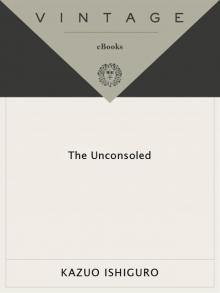 The Unconsoled
The Unconsoled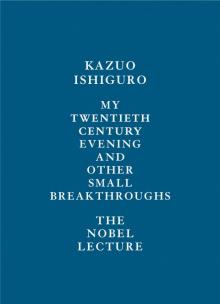 My Twentieth Century Evening and Other Small Breakthroughs: The Nobel Lecture
My Twentieth Century Evening and Other Small Breakthroughs: The Nobel Lecture An Artist of the Floating World
An Artist of the Floating World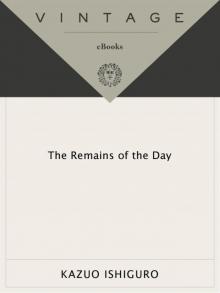 The Remains of the Day
The Remains of the Day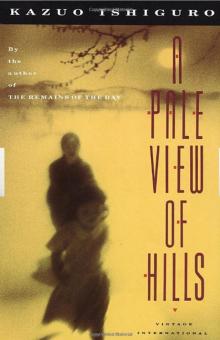 A Pale View of Hills
A Pale View of Hills Nocturnes: Five Stories of Music and Nightfall
Nocturnes: Five Stories of Music and Nightfall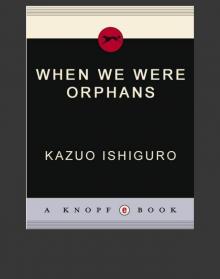 When We Were Orphans
When We Were Orphans Klara and the Sun
Klara and the Sun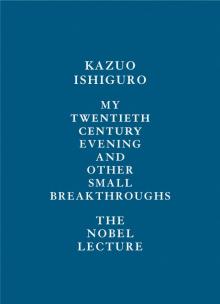 The Nobel Lecture 2017
The Nobel Lecture 2017